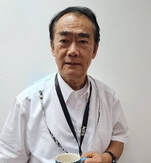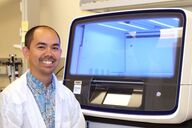Research scientists at several national and international institutions are engaged in ongoing scientific collaborations with the NeuroHIV Cure Consortium.
Collaborators

Victor Valcour, MD, PhD
Dr. Valcour, a Founding Director of INHCC, alongside Dr Ananworanich, is the inaugural Executive Director of the Global Brain Health Institute (GBHI) and a geriatrician at the Memory and Aging Center at UCSF, where he cares for older patients with cognitive disorders and directs international studies on dementia. His research focuses on the impact of HIV on brain function and international capacity development. In Africa, he has partnered with the MHRP to survey cognitive disorders among HIV-infected individuals in Nigeria, Uganda, Kenya, and Tanzania. Dr. Valcour is actively engaged in mentoring individuals wishing to become independent clinical researchers. His research portfolio provides a broad array of local and international projects that can serve as resources for mentored projects.
Dr. Valcour, a Founding Director of INHCC, alongside Dr Ananworanich, is the inaugural Executive Director of the Global Brain Health Institute (GBHI) and a geriatrician at the Memory and Aging Center at UCSF, where he cares for older patients with cognitive disorders and directs international studies on dementia. His research focuses on the impact of HIV on brain function and international capacity development. In Africa, he has partnered with the MHRP to survey cognitive disorders among HIV-infected individuals in Nigeria, Uganda, Kenya, and Tanzania. Dr. Valcour is actively engaged in mentoring individuals wishing to become independent clinical researchers. His research portfolio provides a broad array of local and international projects that can serve as resources for mentored projects.

Jintanat Ananworanich, MD, PhD
Dr Ananworanich, is a Founding Director of INHCC, alongside Dr Valcour. She is Senior Director, Clinical Development, Infectious Diseases at Moderna. She was previously the Clinical Development Leader at the Bill & Melinda Gates Medical Research Institute (Gates MRI), Associate Director for Therapeutics Research for the US Military HIV Research Program and Co-Director of SEARCH at the Thai Red Cross AIDS Research Center in Bangkok. She is Professor of Medicine at the Department of Global Health, the University of Amsterdam and Professor of Pediatrics at the University of Maryland School of Medicine. For the past two decades, she has led over 100 HIV clinical studies and published more than 250 articles in peer-reviewed journals. Her research interests are in acute HIV infection, HIV cure and HIV-associated neurocognition. She is protocol chair of several studies evaluating early treatment and immune interventions aimed at achieving HIV remission in adults and children living with HIV.
Dr Ananworanich, is a Founding Director of INHCC, alongside Dr Valcour. She is Senior Director, Clinical Development, Infectious Diseases at Moderna. She was previously the Clinical Development Leader at the Bill & Melinda Gates Medical Research Institute (Gates MRI), Associate Director for Therapeutics Research for the US Military HIV Research Program and Co-Director of SEARCH at the Thai Red Cross AIDS Research Center in Bangkok. She is Professor of Medicine at the Department of Global Health, the University of Amsterdam and Professor of Pediatrics at the University of Maryland School of Medicine. For the past two decades, she has led over 100 HIV clinical studies and published more than 250 articles in peer-reviewed journals. Her research interests are in acute HIV infection, HIV cure and HIV-associated neurocognition. She is protocol chair of several studies evaluating early treatment and immune interventions aimed at achieving HIV remission in adults and children living with HIV.

Sandhya (Sandy) Vasan, MD
Dr. Vasan serves as Director of the HJF component of the US Military HIV Research Program (MHRP) and Emerging Infectious Disease Branch (EIDB) at the Walter Reed Army Institute of Research and is a former director of the INHCC. Dr. Vasan obtained her undergraduate degree in mechanical engineering at the Massachusetts Institute of Technology before completing her MD at the Harvard-MIT Division of Health Sciences and Technology at Harvard Medical School. Dr. Vasan recently served as MHRP’s Associate Director for HIV Vaccine Research, and prior to that she served MHRP at AFRIMS in Bangkok for seven years as Science Director and head of the Nonhuman Primate Laboratory. At AFRIMS, she conducted preventive vaccine trials in follow-up to the RV144 HIV vaccine clinical trial.
Dr. Vasan serves as Director of the HJF component of the US Military HIV Research Program (MHRP) and Emerging Infectious Disease Branch (EIDB) at the Walter Reed Army Institute of Research and is a former director of the INHCC. Dr. Vasan obtained her undergraduate degree in mechanical engineering at the Massachusetts Institute of Technology before completing her MD at the Harvard-MIT Division of Health Sciences and Technology at Harvard Medical School. Dr. Vasan recently served as MHRP’s Associate Director for HIV Vaccine Research, and prior to that she served MHRP at AFRIMS in Bangkok for seven years as Science Director and head of the Nonhuman Primate Laboratory. At AFRIMS, she conducted preventive vaccine trials in follow-up to the RV144 HIV vaccine clinical trial.

Lishomwa (Lish) C. Ndhlovu, MD, PhD
Dr. Ndhlovu, an American Society of Microbiology Fellow, is a Professor of Immunology and Director of the HIV Immunopathogenesis Laboratory in the Department of Medicine, Division of Infectious Diseases at Weill Cornell Medicine (WCM) and a faculty member of the WCM Cardiovascular Research Institute in New York. After completing medical training, his scientific career began at Tohoku University in Japan where he received his PhD in Immunology and pursued post-doctoral training at the University of California-San Francisco, as an Irvington Institute Fellow of the Cancer Research Institute. The Ndhlovu Laboratory has specific interests in pioneering discoveries for achieving a cure for HIV and strives to promote research methods in disadvantaged settings with ongoing studies in Myanmar, Thailand and across Africa. He has served in multiple editorial roles including being the current Co-Editor in Chief of the journal AIDS Research and Human Retroviruses.
Dr. Ndhlovu, an American Society of Microbiology Fellow, is a Professor of Immunology and Director of the HIV Immunopathogenesis Laboratory in the Department of Medicine, Division of Infectious Diseases at Weill Cornell Medicine (WCM) and a faculty member of the WCM Cardiovascular Research Institute in New York. After completing medical training, his scientific career began at Tohoku University in Japan where he received his PhD in Immunology and pursued post-doctoral training at the University of California-San Francisco, as an Irvington Institute Fellow of the Cancer Research Institute. The Ndhlovu Laboratory has specific interests in pioneering discoveries for achieving a cure for HIV and strives to promote research methods in disadvantaged settings with ongoing studies in Myanmar, Thailand and across Africa. He has served in multiple editorial roles including being the current Co-Editor in Chief of the journal AIDS Research and Human Retroviruses.

Robert Paul, PhD
A Curators' Distinguished Professor, Dr Robert Paul, serves as Executive Director of the Missouri Institute of Mental Health and is a Professor of Psychological Sciences at the University of Missouri-St Louis. Dr Paul earned his PhD in Biological Psychology from the University of Oklahoma Health Science Center and completed his internship and postdoctoral fellowship in Neuropsychology at Brown Medical School. Dr. Paul’s research team has developed specific expertise in HIV, subcortical stroke, and early life trauma, three conditions that impact the integrity of deep brain structures including: white matter, basal ganglia, and limbic structures. Investigations include leveraging innovative neuroinformatic models and artificial intelligence (AI) to discover latent, clinically relevant structure and meaning within large and complex data matrices. Dr. Paul has a special interest in the application of these methods in resource-limited environments and has active research programs in South Africa, Thailand, Vietnam, and Cambodia.
A Curators' Distinguished Professor, Dr Robert Paul, serves as Executive Director of the Missouri Institute of Mental Health and is a Professor of Psychological Sciences at the University of Missouri-St Louis. Dr Paul earned his PhD in Biological Psychology from the University of Oklahoma Health Science Center and completed his internship and postdoctoral fellowship in Neuropsychology at Brown Medical School. Dr. Paul’s research team has developed specific expertise in HIV, subcortical stroke, and early life trauma, three conditions that impact the integrity of deep brain structures including: white matter, basal ganglia, and limbic structures. Investigations include leveraging innovative neuroinformatic models and artificial intelligence (AI) to discover latent, clinically relevant structure and meaning within large and complex data matrices. Dr. Paul has a special interest in the application of these methods in resource-limited environments and has active research programs in South Africa, Thailand, Vietnam, and Cambodia.

Trevor Crowell, MD
Dr. Crowell is Associate Director of the Department of Epidemiology and Threat Assessment at MHRP, where he oversees cohorts and other epidemiologic studies of HIV, sexually transmitted infections, and other infectious disease threats to global public health and U.S. military force readiness. Dr. Crowell has published extensively on clinical outcomes among persons living with or at risk for HIV, with a focus on U.S. military service members, sexual and gender minority populations, elite controllers, and individuals diagnosed during acute HIV infection. His current research also includes clinical trials of novel interventions to achieve HIV remission as well as preventive vaccine candidates for HIV and other infectious diseases.
Dr. Crowell is Associate Director of the Department of Epidemiology and Threat Assessment at MHRP, where he oversees cohorts and other epidemiologic studies of HIV, sexually transmitted infections, and other infectious disease threats to global public health and U.S. military force readiness. Dr. Crowell has published extensively on clinical outcomes among persons living with or at risk for HIV, with a focus on U.S. military service members, sexual and gender minority populations, elite controllers, and individuals diagnosed during acute HIV infection. His current research also includes clinical trials of novel interventions to achieve HIV remission as well as preventive vaccine candidates for HIV and other infectious diseases.

Somchai Sriplienchan, MD, MPH
Dr. Somchai Sriplienchan is Executive Director at SEARCH Research Foundation in Bangkok, Thailand. He has worked as a field director and investigator in numerous multi-site and multi-country HIV and STI studies including: perinatal, contraception & HIV acquisition, and HPV investigations. He has also served as Thailand Country Director at FHI 360 to implement HIV prevention deliverables to the higher HIV-risk populations in Thailand. As an INHCC collaborator, Dr Sriplienchan leads our clinical research investigations in the acute HIV cohort, in addition to his other leadership roles with TRCARC and IHRI.
Dr. Somchai Sriplienchan is Executive Director at SEARCH Research Foundation in Bangkok, Thailand. He has worked as a field director and investigator in numerous multi-site and multi-country HIV and STI studies including: perinatal, contraception & HIV acquisition, and HPV investigations. He has also served as Thailand Country Director at FHI 360 to implement HIV prevention deliverables to the higher HIV-risk populations in Thailand. As an INHCC collaborator, Dr Sriplienchan leads our clinical research investigations in the acute HIV cohort, in addition to his other leadership roles with TRCARC and IHRI.

Carlo Sacdalan, MD, MBA
Dr. Carlo Sacdalan is Head of Clinical Research Physician at SEARCH Research Foundation in Bangkok, Thailand. He is currently handling the acute HIV cohort (SEARCH010/RV254) and the comparator study, SEARCH013/RV304 . He is a published research physician with prior experience working for a clinical research organization. Dr. Sacdalan earned his dual degree of MD and MBA from the Ateneo School of Medicine and Public Health in Manila, Philippines. He is currently pursuing a MSc in Public Health from the University of London, London School of Hygiene and Tropical Medicine.
Dr. Carlo Sacdalan is Head of Clinical Research Physician at SEARCH Research Foundation in Bangkok, Thailand. He is currently handling the acute HIV cohort (SEARCH010/RV254) and the comparator study, SEARCH013/RV304 . He is a published research physician with prior experience working for a clinical research organization. Dr. Sacdalan earned his dual degree of MD and MBA from the Ateneo School of Medicine and Public Health in Manila, Philippines. He is currently pursuing a MSc in Public Health from the University of London, London School of Hygiene and Tropical Medicine.

Eugene Kroon, MD
Eugène Kroon, recently retired, was the Medical Doctor Supervisor at the IHRI, based in Bangkok. He started his career in clinical HIV research in Amsterdam in 1994 under Professor Joep Lange and has mostly worked in Thailand since 1996. The focus of his early HIV research was in new antiretroviral therapies and access to effective ART in Thailand and in emerging economies. This research contributed to marketing authorization of drugs such as nevirapine and ritonavir and also contributed to the Thai government’s decision, in the early 2000s, to expand access to ART. He also contributed to rolling out ART with the Clinton HIV-AIDS Initiative in South-Africa. His current work focuses on describing acute HIV infection and on HIV cure strategies. The RV254 study has already provided valuable insights regarding the former while this cohort of virally suppressed acutely infected subjects are now participating in HIV functional cure studies at IHRI.
Eugène Kroon, recently retired, was the Medical Doctor Supervisor at the IHRI, based in Bangkok. He started his career in clinical HIV research in Amsterdam in 1994 under Professor Joep Lange and has mostly worked in Thailand since 1996. The focus of his early HIV research was in new antiretroviral therapies and access to effective ART in Thailand and in emerging economies. This research contributed to marketing authorization of drugs such as nevirapine and ritonavir and also contributed to the Thai government’s decision, in the early 2000s, to expand access to ART. He also contributed to rolling out ART with the Clinton HIV-AIDS Initiative in South-Africa. His current work focuses on describing acute HIV infection and on HIV cure strategies. The RV254 study has already provided valuable insights regarding the former while this cohort of virally suppressed acutely infected subjects are now participating in HIV functional cure studies at IHRI.

Shelli Farhadian, MD, PhD
Dr. Shelli Farhadian is Assistant Professor of Medicine (Infectious Diseases) & Neurology at the Yale School of Medicine, where she received her clinical training in Internal Medicine, Infectious Diseases, and Neuroinfectious Diseases and completed post-doctoral training in Dr. Serena Spudich’s lab. Dr. Farhadian is supported by an NIMH-sponsored K23 career development award for studies of neuroimmune responses and viral persistence in chronic HIV infection. She was a co-lead investigator of IMPACT, the Yale COVID-19 biorepository study, where work conducted helped characterize immune responses to COVID-19. Her current research is dedicated to understanding CNS abnormalities in adults with HIV, COVID-19, and other infectious diseases, employing tools that probe the CNS, including CSF single-cell genomic studies. Dr Farhadian is a practicing infectious disease physician, caring for adults with HIV, COVID-19, and other infections.
Dr. Shelli Farhadian is Assistant Professor of Medicine (Infectious Diseases) & Neurology at the Yale School of Medicine, where she received her clinical training in Internal Medicine, Infectious Diseases, and Neuroinfectious Diseases and completed post-doctoral training in Dr. Serena Spudich’s lab. Dr. Farhadian is supported by an NIMH-sponsored K23 career development award for studies of neuroimmune responses and viral persistence in chronic HIV infection. She was a co-lead investigator of IMPACT, the Yale COVID-19 biorepository study, where work conducted helped characterize immune responses to COVID-19. Her current research is dedicated to understanding CNS abnormalities in adults with HIV, COVID-19, and other infectious diseases, employing tools that probe the CNS, including CSF single-cell genomic studies. Dr Farhadian is a practicing infectious disease physician, caring for adults with HIV, COVID-19, and other infections.

Michael Corley, PhD, MA
Dr. Corley is an Assistant Professor in Medicine at the Division of Infectious Diseases at Weill Cornell Medicine. He received a MA and PhD in Behavioral Neuroscience from the University of Hawaii and completed postdoctoral training in epigenetics, health disparities, immunology, and infectious disease. Dr. Corley’s research focuses on better understanding host epigenetic mechanisms in immune cells reprogrammed by HIV infection and investigating how an individual’s unique epigenetic signature predicts innate and adaptive immune cell responses and longitudinal brain health outcomes following HIV exposure. His laboratory is also dedicated to utilizing cutting-edge “omics” technologies to increase knowledge towards addressing health inequalities and infectious disease.
Dr. Corley is an Assistant Professor in Medicine at the Division of Infectious Diseases at Weill Cornell Medicine. He received a MA and PhD in Behavioral Neuroscience from the University of Hawaii and completed postdoctoral training in epigenetics, health disparities, immunology, and infectious disease. Dr. Corley’s research focuses on better understanding host epigenetic mechanisms in immune cells reprogrammed by HIV infection and investigating how an individual’s unique epigenetic signature predicts innate and adaptive immune cell responses and longitudinal brain health outcomes following HIV exposure. His laboratory is also dedicated to utilizing cutting-edge “omics” technologies to increase knowledge towards addressing health inequalities and infectious disease.

Phillip Chan, MBChB, PhD, MRCP
Phillip Chan is an Associate Research Scientist with the Spudich Lab at Yale School of Medicine. After graduation from the medical school of the Chinese University of Hong Kong, he completed his fellowships in internal medicine and Neurology at the Queen Elizabeth Hospital of Hong Kong. In 2015, he joined SEARCH at the Institute of HIV Research and Innovation (IHRI) in Thailand, working with MHRP, IHRI, and the INHCC. Dr Chan has also worked with the Hong Kong University of Science and Technology for neurodegenerative disease research projects since 2018.
Phillip Chan is an Associate Research Scientist with the Spudich Lab at Yale School of Medicine. After graduation from the medical school of the Chinese University of Hong Kong, he completed his fellowships in internal medicine and Neurology at the Queen Elizabeth Hospital of Hong Kong. In 2015, he joined SEARCH at the Institute of HIV Research and Innovation (IHRI) in Thailand, working with MHRP, IHRI, and the INHCC. Dr Chan has also worked with the Hong Kong University of Science and Technology for neurodegenerative disease research projects since 2018.

Kathryn Holroyd, MD
Katie Holroyd is an Assistant Professor of Neurology at Columbia University Irving Medical Center. She attended medical school at the Johns Hopkins University School of Medicine, and Neurology residency and Neuroimmunology fellowship at Massachusetts General Brigham/Harvard Medical School. She then completed the INHCC neuroinfectious diseases and global health fellowship in Bangkok, Thailand, where she lived for two years conducting research focused on the cerebrovascular complications of HIV infection. Dr. Holroyd's clinical work is dedicated to a neurohospitalist practice, where she specializes in the diagnosis and treatment of neuroinflammatory and neuroinfectious diseases including encephalitis, herpesviruses, syphilis, and HIV. Dr. Holroyd is currently the medical student and residency education director for neuro-infectious disease and global health, and assists in running the post-doctoral neuroinfectious disease clinical research fellowship for LIC and LMIC physician-scientists at Columbia.
Katie Holroyd is an Assistant Professor of Neurology at Columbia University Irving Medical Center. She attended medical school at the Johns Hopkins University School of Medicine, and Neurology residency and Neuroimmunology fellowship at Massachusetts General Brigham/Harvard Medical School. She then completed the INHCC neuroinfectious diseases and global health fellowship in Bangkok, Thailand, where she lived for two years conducting research focused on the cerebrovascular complications of HIV infection. Dr. Holroyd's clinical work is dedicated to a neurohospitalist practice, where she specializes in the diagnosis and treatment of neuroinflammatory and neuroinfectious diseases including encephalitis, herpesviruses, syphilis, and HIV. Dr. Holroyd is currently the medical student and residency education director for neuro-infectious disease and global health, and assists in running the post-doctoral neuroinfectious disease clinical research fellowship for LIC and LMIC physician-scientists at Columbia.

Shelly J. Krebs, PhD
Dr. Krebs is a Scientist and Principal Investigator at the U.S. Military HIV Research Program (MHRP) located at the Walter Reed Army Institute of Research. She earned her PhD at Dartmouth Medical School and was a postdoctoral fellow at the Centers of Disease Control and Association of Public Health Laboratories, as well as at the Vaccine and Gene Therapy Institute. She joined MHRP in 2012 to study the development of HIV-specific B cell responses and immune activation in HIV infection and vaccination. A major goal of the Krebs laboratory is to further understand how HIV infected individuals naturally develop potent antibody responses to be able to exploit these characteristics in the design of HIV immunogens.
Dr. Krebs is a Scientist and Principal Investigator at the U.S. Military HIV Research Program (MHRP) located at the Walter Reed Army Institute of Research. She earned her PhD at Dartmouth Medical School and was a postdoctoral fellow at the Centers of Disease Control and Association of Public Health Laboratories, as well as at the Vaccine and Gene Therapy Institute. She joined MHRP in 2012 to study the development of HIV-specific B cell responses and immune activation in HIV infection and vaccination. A major goal of the Krebs laboratory is to further understand how HIV infected individuals naturally develop potent antibody responses to be able to exploit these characteristics in the design of HIV immunogens.

Kilian Pohl, PhD
Dr. Kilian Pohl is an Associate Professor in Psychiatry and Behavioral Sciences at Stanford University, has a secondary appointment as Program Director of Biomedical Computing at SRI International, and leads the Computational Neuroscience Laboratory. Dr. Pohl received his PhD from the Artificial Intelligence Laboratory at the Massachusetts Institute of Technology for advancing the analysis of brain MRI via machine learning technology. He now focuses on developing computational models aimed at identifying biomedical phenotypes improving the mechanistic understanding, diagnosis, and treatment of neuropsychiatric disorders such as HIV-associated Neurocognitive Disorder. His research is funded by several NIH Institutes and received peer recognition including the “2014 Creative and Novel Ideas in HIV Research” award.
Dr. Kilian Pohl is an Associate Professor in Psychiatry and Behavioral Sciences at Stanford University, has a secondary appointment as Program Director of Biomedical Computing at SRI International, and leads the Computational Neuroscience Laboratory. Dr. Pohl received his PhD from the Artificial Intelligence Laboratory at the Massachusetts Institute of Technology for advancing the analysis of brain MRI via machine learning technology. He now focuses on developing computational models aimed at identifying biomedical phenotypes improving the mechanistic understanding, diagnosis, and treatment of neuropsychiatric disorders such as HIV-associated Neurocognitive Disorder. His research is funded by several NIH Institutes and received peer recognition including the “2014 Creative and Novel Ideas in HIV Research” award.

Adam W Carrico, PhD
Adam Carrico completed his doctorate in clinical-health psychology at the University of Miami where he specialized in the interdisciplinary field of psychoneuroimmunology, which examines the bi-directional connections between the central nervous system and immune system. His team was the first to demonstrate that recent stimulant use among sexual minority men with treated HIV infection is associated with alterations in key pathophysiologic processes relevant to HIV pathogenesis such as immune activation and inflammation. Currently, Dr. Carrico is co-leading a randomized controlled trial funded by the National Institute of Mental Health (NIMH) examining the effects of cognitive-behavioral treatment for adherence and depression on the microbiome-gut-brain axis in people with HIV who have evidence of elevated inflammation.
Adam Carrico completed his doctorate in clinical-health psychology at the University of Miami where he specialized in the interdisciplinary field of psychoneuroimmunology, which examines the bi-directional connections between the central nervous system and immune system. His team was the first to demonstrate that recent stimulant use among sexual minority men with treated HIV infection is associated with alterations in key pathophysiologic processes relevant to HIV pathogenesis such as immune activation and inflammation. Currently, Dr. Carrico is co-leading a randomized controlled trial funded by the National Institute of Mental Health (NIMH) examining the effects of cognitive-behavioral treatment for adherence and depression on the microbiome-gut-brain axis in people with HIV who have evidence of elevated inflammation.

Nittaya Phanuphak, MD, PhD
Nittaya Phanuphak is the Executive Director of the Institute of HIV Research and Innovation (IHRI) in Bangkok, Thailand. She started her career in the HIV field in 2002 by leading a nationwide prevention of mother-to-child transmission operational study which resulted in Thai guidelines allowing the use of three-drug antiretroviral regimens for pregnant women in 2010. Nittaya has a deep interest in Key Population-Led Health Services (KPLHS). KPLHS approaches empower lay providers who are members of KP communities to perform HIV/STI testing and dispense PrEP/PEP, antiretroviral treatment and STI treatment to their peers. Dr. Nittaya has more than 60 publications in peer-reviewed journals.
Nittaya Phanuphak is the Executive Director of the Institute of HIV Research and Innovation (IHRI) in Bangkok, Thailand. She started her career in the HIV field in 2002 by leading a nationwide prevention of mother-to-child transmission operational study which resulted in Thai guidelines allowing the use of three-drug antiretroviral regimens for pregnant women in 2010. Nittaya has a deep interest in Key Population-Led Health Services (KPLHS). KPLHS approaches empower lay providers who are members of KP communities to perform HIV/STI testing and dispense PrEP/PEP, antiretroviral treatment and STI treatment to their peers. Dr. Nittaya has more than 60 publications in peer-reviewed journals.

Diane Bolton, PhD
Dr Diane Bolton is Chief, Animal Models and Pathogenesis at the US Military HIV Research Program (MHRP) located at the Walter Reed Army Institute of Research in Silver Spring, MD. She earned her PhD though the Johns Hopkins University-NIH cooperative graduate program and her postdoctoral fellowship with Dr Mario Roederer at NIH’s Vaccine Research Center in Bethesda, MD. Dr. Bolton’s interests focus on immune responses to vaccination and mechanisms of viral persistence during HIV/SIV infection. Her team explores the adaptive immune responses to prophylactic and therapeutic vaccine regimens to elucidate cellular and humoral correlates of protection.
Dr Diane Bolton is Chief, Animal Models and Pathogenesis at the US Military HIV Research Program (MHRP) located at the Walter Reed Army Institute of Research in Silver Spring, MD. She earned her PhD though the Johns Hopkins University-NIH cooperative graduate program and her postdoctoral fellowship with Dr Mario Roederer at NIH’s Vaccine Research Center in Bethesda, MD. Dr. Bolton’s interests focus on immune responses to vaccination and mechanisms of viral persistence during HIV/SIV infection. Her team explores the adaptive immune responses to prophylactic and therapeutic vaccine regimens to elucidate cellular and humoral correlates of protection.

Donn Colby, MD, MPH
Dr. Donn Colby has dedicated most of his career to HIV prevention and treatment in Southeast Asia. He recently returned to the US, joining MHRP, after 18 years of living and working in Vietnam and Thailand. While at the Thai Red Cross AIDS Research Center, he led multiple clinical trials to investigate new treatment methods with the goal of inducing a remission or cure of HIV infection, including innovative trials of monoclonal antibodies and therapeutic vaccines. Donn’s research collaborations have also shed light on antiretroviral drug resistance and its effect on the future of HIV prevention and treatment, as well as on the safety and efficacy of pre-exposure prophylaxis (PrEP), a daily pill for HIV prevention. As part of this effort, he set up the first publicly accessible clinic for provision of PrEP in Asia.
Dr. Donn Colby has dedicated most of his career to HIV prevention and treatment in Southeast Asia. He recently returned to the US, joining MHRP, after 18 years of living and working in Vietnam and Thailand. While at the Thai Red Cross AIDS Research Center, he led multiple clinical trials to investigate new treatment methods with the goal of inducing a remission or cure of HIV infection, including innovative trials of monoclonal antibodies and therapeutic vaccines. Donn’s research collaborations have also shed light on antiretroviral drug resistance and its effect on the future of HIV prevention and treatment, as well as on the safety and efficacy of pre-exposure prophylaxis (PrEP), a daily pill for HIV prevention. As part of this effort, he set up the first publicly accessible clinic for provision of PrEP in Asia.

Alexandra Schuetz, PhD
Dr. Schuetz currently serves as Chief of Cellular Immunology the Armed Forces Research Institute of Medical Sciences (AFRIMS) in Thailand. She received her PhD in 2004 from the University of Saarland, Germany, in collaboration with Bayer HealthCare AG, After working at the Fraunhofer Institute for Biomedical Engineering, she joined MHRP in 2006 and relocated to Mbeya, Tanzania, serving as Head of Immunology and Specimen Processing. .In 2008, she relocated to Bangkok, Thailand, to continue work for MHRP and is since then involved in research on acute HIV infection, cure studies and HIV vaccine trials. Her lab is interested in understanding the mechanisms by which HIV infection causes dysfunction of the gastrointestinal and reproductive tracts and the lymphoid immune systems.
Dr. Schuetz currently serves as Chief of Cellular Immunology the Armed Forces Research Institute of Medical Sciences (AFRIMS) in Thailand. She received her PhD in 2004 from the University of Saarland, Germany, in collaboration with Bayer HealthCare AG, After working at the Fraunhofer Institute for Biomedical Engineering, she joined MHRP in 2006 and relocated to Mbeya, Tanzania, serving as Head of Immunology and Specimen Processing. .In 2008, she relocated to Bangkok, Thailand, to continue work for MHRP and is since then involved in research on acute HIV infection, cure studies and HIV vaccine trials. Her lab is interested in understanding the mechanisms by which HIV infection causes dysfunction of the gastrointestinal and reproductive tracts and the lymphoid immune systems.

Bonnie Slike, MS
Ms. Slike is a Senior Research Associate for the Henry M. Jackson Foundation in support of the U.S. Military HIV Research Program (MHRP) located at Walter Reed Army Institute for Research. She joined MHRP in 2005 and has over 20 years of research experience in the areas of cell biology, immunology and HIV. Since 2012, she has been a part of the B Cell Biology Core lead by Dr. Shelly Krebs. Her work focusses on two primary areas: investigation of the role of soluble immune factors in HIV infection and pathogenesis, and characterization of binding antibodies elicited following vaccination or infection.
Ms. Slike is a Senior Research Associate for the Henry M. Jackson Foundation in support of the U.S. Military HIV Research Program (MHRP) located at Walter Reed Army Institute for Research. She joined MHRP in 2005 and has over 20 years of research experience in the areas of cell biology, immunology and HIV. Since 2012, she has been a part of the B Cell Biology Core lead by Dr. Shelly Krebs. Her work focusses on two primary areas: investigation of the role of soluble immune factors in HIV infection and pathogenesis, and characterization of binding antibodies elicited following vaccination or infection.

Caroline Subra, PhD
Dr. Subra is a Scientist at Henry Jackson Foundation. She obtained her PhD in Cellular Biology and Biochemistry at the University of Toulouse, France, in 2010. Dr Subra performed post-doctoral training studying exosome implication in HIV pathogenesis at the Laval University in Quebec City, Canada. She joined Dr. Trautmann’s MHRP laboratory, in 2016, to study the cellular immune response to HIV infection and assess the implication of exosomes in acute HIV infection and in modulating the immune response. Her research interests include the cellular immune response to AHI in the CNS to decipher the mechanisms leading to neuroHIV.
Dr. Subra is a Scientist at Henry Jackson Foundation. She obtained her PhD in Cellular Biology and Biochemistry at the University of Toulouse, France, in 2010. Dr Subra performed post-doctoral training studying exosome implication in HIV pathogenesis at the Laval University in Quebec City, Canada. She joined Dr. Trautmann’s MHRP laboratory, in 2016, to study the cellular immune response to HIV infection and assess the implication of exosomes in acute HIV infection and in modulating the immune response. Her research interests include the cellular immune response to AHI in the CNS to decipher the mechanisms leading to neuroHIV.

Holly Peay, PhD, MS
Holly Peay is a Senior Research Public Health Analyst at RTI International. She is a trained in bioethics, genetic counseling and social science. Her research areas of interest are decision making, decision support, quantification of patient and caregiver preferences, and disorder-specific adaptation. She has experience using multiple social science and health economic techniques, both well established and innovative, to explore needs, preferences, experiences, coping and adaptation, risk perception, and decision making.
Holly Peay is a Senior Research Public Health Analyst at RTI International. She is a trained in bioethics, genetic counseling and social science. Her research areas of interest are decision making, decision support, quantification of patient and caregiver preferences, and disorder-specific adaptation. She has experience using multiple social science and health economic techniques, both well established and innovative, to explore needs, preferences, experiences, coping and adaptation, risk perception, and decision making.

Gail Henderson, PhD
Dr Henderson is a professor of Social Medicine in the School of Medicine and adjunct professor of Sociology at the University of North Carolina at Chapel Hill. She was Department Chair from 2009 to 2015, Director of the UNC Center for Genomics and Society (CGS) from 2007-2019, and co-Director of the Center for AIDS Research (CFAR) International Core from 2004-2014. Dr Henderson was the Ethical, Legal and Social Implications (ELSI) Editor of the journal, Genetics in Medicine, from 2009-2017, and a Member of the National Human Genome Research Institute (NHGRI) Advisory Council from 2016-2020.
Dr Henderson is a professor of Social Medicine in the School of Medicine and adjunct professor of Sociology at the University of North Carolina at Chapel Hill. She was Department Chair from 2009 to 2015, Director of the UNC Center for Genomics and Society (CGS) from 2007-2019, and co-Director of the Center for AIDS Research (CFAR) International Core from 2004-2014. Dr Henderson was the Ethical, Legal and Social Implications (ELSI) Editor of the journal, Genetics in Medicine, from 2009-2017, and a Member of the National Human Genome Research Institute (NHGRI) Advisory Council from 2016-2020.
The following institutions are involved in ongoing scientific collaborations with the INHCC:
- U.S. Military HIV Research Program (MHRP), Bethesda, MD
- Henry M. Jackson Foundation (HJF), Bethesda, MD
- Walter Reed Army Institute of Research (WRAIR), Rockville, MD
- Armed Forces Research Institute of Medical Sciences (AFRIMS), Thailand and US
- Southeast Asia Research Collaboration with Hawaii (SEARCH), Bangkok, Thailand
- Institute of HIV Research and Innovation (IHRI), Bangkok, Thailand
- Chulalongkorn University, Bangkok, Thailand
- Thai Red Cross AIDS Research Centre (TRCARC), Bangkok, Thailand
